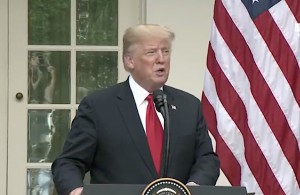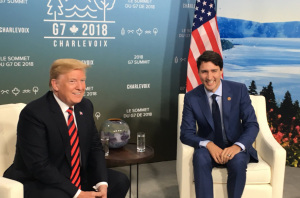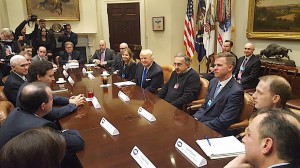
President Donald Trump has been rebuked by Republican lawmakers and automakers for enacting $200 billion in tariffs against China.
President Donald Trump and his increasingly aggressive trade measures are coming under fire from unusual quarters: the GOP side of the Senate and normally Republican-friendly automakers.
The backlash comes just days after the Trump Administration enacted $200 billion in new tariffs on Chinese imports and in the wake of the president’s decision not to meet with Canadian Prime Minister Justin Trudeau. Instead, Trump is warning of new barriers to Canadian-made autos and auto parts that could create nightmares for an auto industry dependent upon a continent-wide production network.
The White House is also readying possible tariffs on European-made automobiles, something that could draw the EU into what is rapidly becoming a global trade war. And the latest threats have finally triggered a pushback from Republicans who have, until now, been loath to seem at odds with the former businessman now leading the country.
“The Tax Foundation estimates that auto tariffs could result in a $73 billion tax increase on American consumers and businesses,” Sen. Orrin Hatch, the veteran Utah Republican chairing the Senate Finance Committee, said Wednesday. “The Peterson Institute calculates that auto tariffs could cause 195,000 workers to lose their jobs … And that’s before other countries retaliate, which could put over 600,000 U.S. jobs at risk. These tariffs could cost the U.S. auto industry up to 2 million lost vehicle sales annually.”
(Trump’s latest round of tariffs impacts car prices. Click Here for the story.)
The White House has already announced two rounds of trade actions targeting China, the most recent enacting tariffs on $200 billion in collective goods. China has retaliated with a series of new duties of its own. Ironically, the world’s largest car market had earlier this year announced steps to reduce tariffs on imported vehicles from 25% to 15%. But U.S.-made cars now face 40% duties.
That is expected to mean sharp cuts in sales of products like the Ford Mustang produced in Detroit and the BMW X5 assembled in South Carolina. Ford has already reduced production of its sporty coupe while BMW hopes to maintain production by finding new markets for the X5.
But both makers – and competitors operating in the U.S. – will have to pay more for foreign-made steel and aluminum under other tariffs enacted by Trump. Also on Wednesday, Ford CEO Jim Hackett confirmed what TheDetroitBureau.com had previously reported, that the metals tariffs will cost it about $1 billion this year.
Hackett also warned that with the industry facing other pressures, the steel and aluminum tariffs may soon wind up being passed onto consumers. Ford isn’t alone in issuing that warning, industry analysts starting to calculate just how much more U.S. motorists may soon be paying for their new cars, trucks and crossovers.
Any price hikes would come at a perilous time for the industry. Last year saw the first drop in domestic car sales since the end of the Great Recession, and another dip is expected as 2018 winds down. That’s despite rising incentives that automakers have been rolling out to maintain market momentum.
(Click Here for more about Trump tariffs.)
As much as the industry worries about added costs to raw materials, however, the bigger worry is having to tear down and rebuild a North American production network built up over the quarter century since the North American Free Trade Agreement went into effect.
Trump recently announced a preliminary deal with Mexico that could update – or possibly replace NAFTA. The question is whether Canada will join in. The Trudeau government has so far been resistant to key demands though the prime minister suggested the two heads of state meet to work out a plan. That request has now been rejected by Pres. Trump.
As has often been the case, the U.S. Commander-in-Chief turned the rejection personal.
“We’ve very unhappy with the negotiations and the negotiating style of Canada. We don’t like their representative very much,” Trump said, apparently referring to Canada’s Minister of Foreign Affairs Chrystia Freeland, who has been handling that country’s end of the NAFTA talks.
Canada could be hard hit by new tariffs as 80% of the vehicles assembled in that country are exported, the lion’s share to the U.S. But auto industry leaders warn that the hit to American consumers would be severe as it would require massive shifts in manufacturing of parts, as well as vehicles, adding billions to their annual cost base.
(To see more about Trump’s auto tariff threat triggering backlash, Click Here.)
For now, Trump is suggesting NAFTA could become the USM, short for U.S.-Mexico, though he is willing to turn it into USMC, should Canada agree to his terms.


